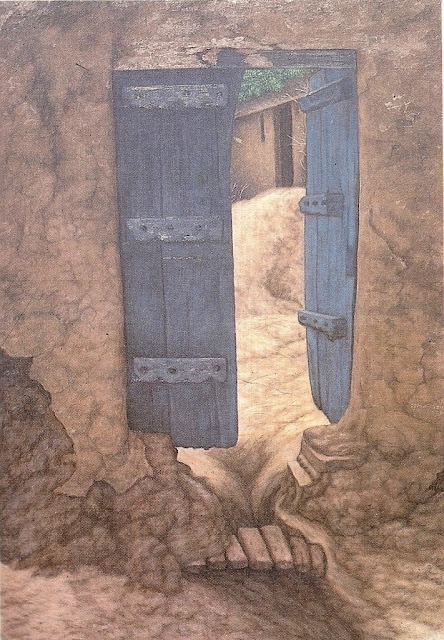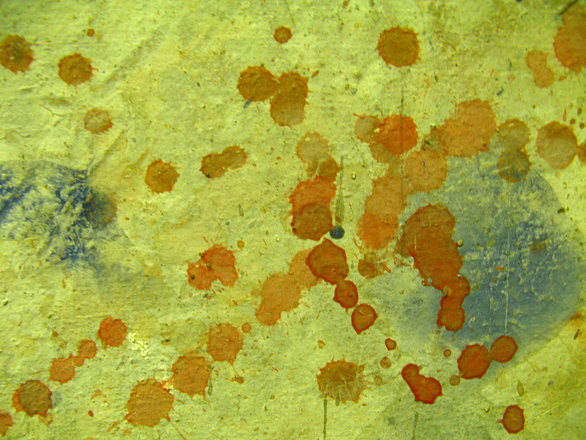Oh I'll die I'll die I'll die
My skin is in blazing furore
I do not know what I'll do where I'll go oh I am sick
I'll kick all Arts in the back and go away Shubha
Shubha let me go and live in your cloaked melon
In the unfastened shadow of dark destroyed saffron curtain
The last anchor is leaving me after I got other anchors lifted
I can't resist anymore, a million glasspanes are breaking in my cortex
I know, Shubha, spread out your matrix, give me peace
Each vein is carrying a stream of tears up to the heart
Brains contagious flints are decomposing out of eternal sickness
Mother why didn't you give me birth in the form of a skeleton
I'd have gone two billion light years and kissed God's arse
But nothing pleases me nothing sounds well
I feel nauseated with more than a single kiss
I've forgotten women during copulation and returned to the Muse
In to the sun coloured bladder
I do not know what these happenings are but they are occurring with me
I'll destroy and shatter everything
Draw and elevate Shubha into my hunger
Shubha will have to be given
Oh Malay
Calcutta seems to be a procession of wet and slippery organs today
But I do not know what I'll do now with my own self
My power of recollection is withering away
Let me ascend alone toward death
I haven't had to learn copulation and dying
I haven't had to learn the responsibility of shedding the last drops after urination
Haven't had to learn to go and lie beside Shubha in the darkness
Have not had to learn Usage of French leather while lying on Nandita's bosom
Though I wanted the healthy spirit of Aleya's fresh chinarose matrix
Yet I submitted to the refuge of my brain's cataclysm
I am failing to understand why I still want to live
I am thinking of my debauched Sabarna-Choudhury ancestors
I'll have to do something different and new
Let me sleep for the last time on a bed soft as the skin of Shubha's bosom
I remember now the sharp-edged radiance of the moment I was born
I want to see my own death before passing away
The world had nothing to do with Malay Roychoudhury
Shubha let me sleep for a few moments in your violent silvery uterus
Give me peace, Shubha, let me have peace
Let my sin-driven skeleton be washed anew in your seasonal bloodstream
Let me create myself in your womb with my own sperm
Would I have been like this if I had different parents
Was Malay alias me possible fron an absolutely different sperm
Would I have been Malay in the womb of other women of my father
Would I have made a professional gentleman of me like my dead brother without Shubha
Oh, answer, let somebody answer these
Shubha, ah Shubha
Let me see the earth through your cellophane hymen
Come back on the green mattress again
As the cathode rays are sucked up with warmth of a magnet's brilliance
I remember the letter of the final decision of 1956
The surroundings of your clitoris were being embellished with coon at that time
Fine rib-smashing roots were descending into your bosom
Stupid relationship inflated in the bypass of senseless neglect
Aaaaaaaaaaaaaaaaaaaaaaaaah
I do not know whether I am going to die
Squandering was roaring within heart's exhaustive impatience
I'll disrupt and destroy
I'll split all inti pieces for the sake of arts
There isn't any other way out for poetry except suicide
Shubha
Let me enter into the immemorial incontinence of your labia majora
In to the absurdity of woeless effort
In the golden chlorophyll of the drunken heart
Why wasn't I lost in my mother's urethra
Why was I driven away in my father's urine after his self-coition
Why wasn't I mixed in the ovum-flux or in the phlegm
With her eyes shut supine beneath me
I felt terribly distressed when I saw comfort seize Shubha
Women could be treacherous even after unfolding a helpless appearance
Today it seems there is nothing treacherous as Women and Art
Now my ferocious heart is running towards an impossible death
Vertigo of water are coming up to my neck from the pierced earth
I will die
Oh what are these happenings within me
I am failing to fetch out my hand and my palm
From the dried sperms on my trousers spreading wings
300000 children gliding toward the district of Shubha's bosom
Millions of needles are now running from my blood into Poetry
Now the smuggling of my obstinate leg is trying to plunge
Into the death-killer sex-wig entangled in the hypnotic kingdom of words
In violent mirrors of each wall of the room I am observing
After letting loose a few naked Malay, his unestablished scramblings.










